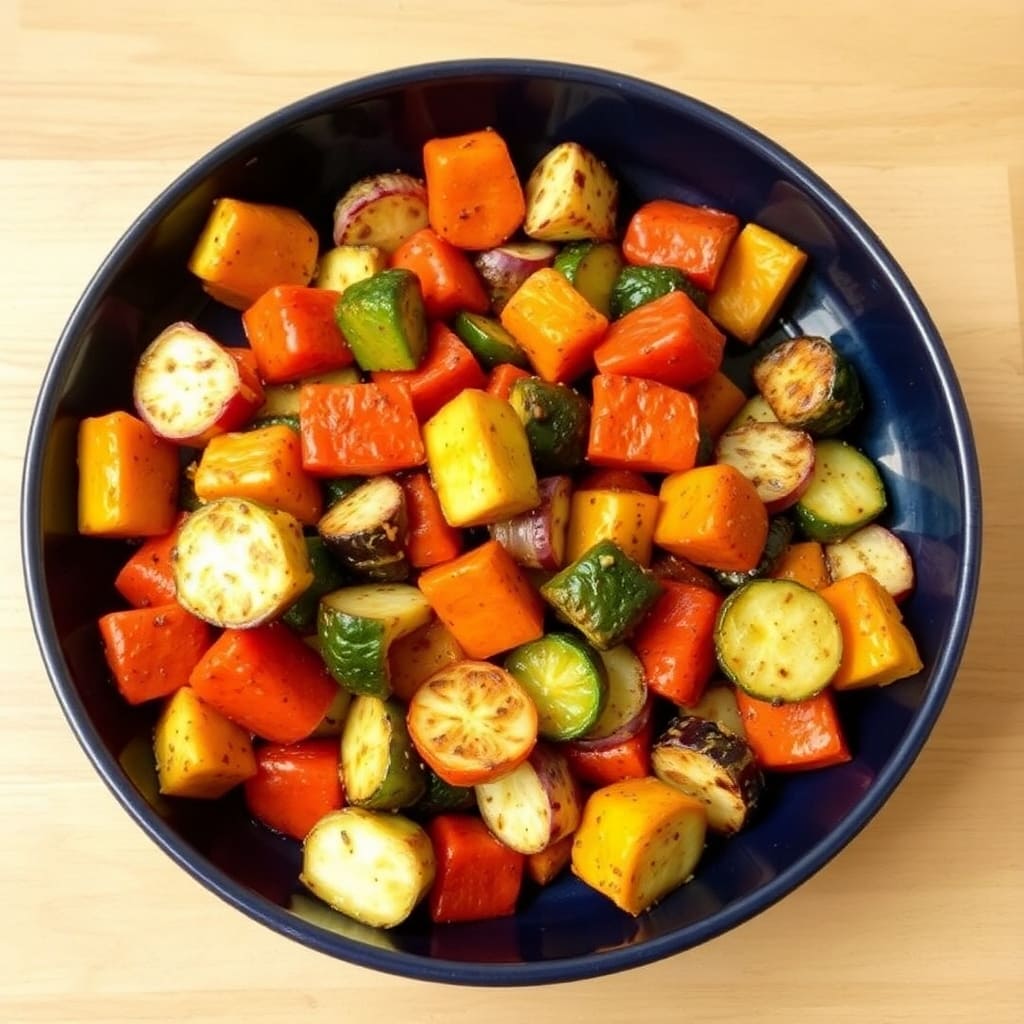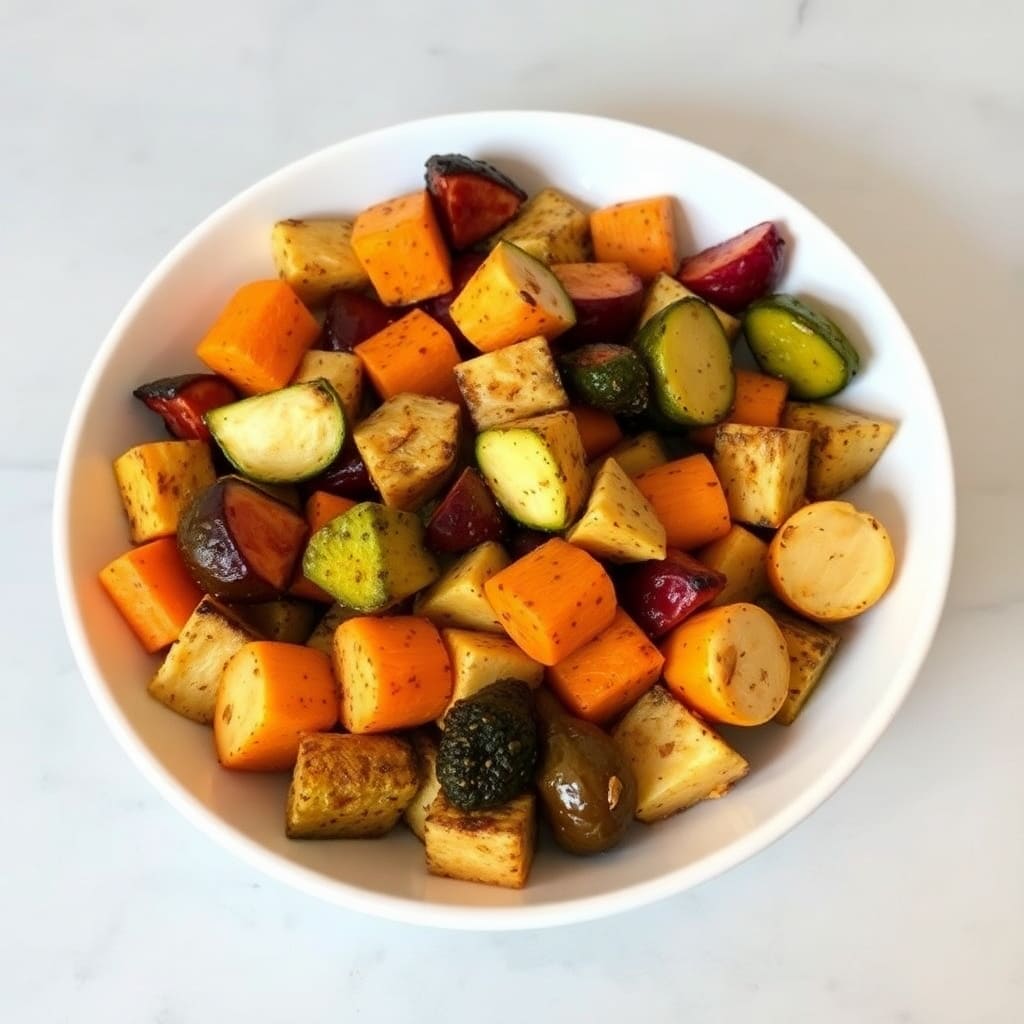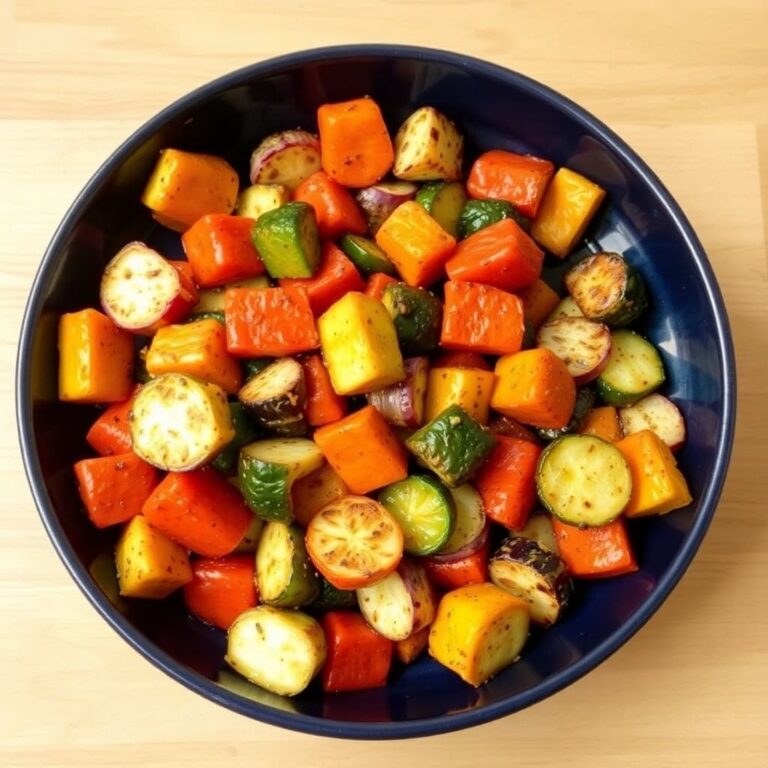Introduction
When it comes to side dishes that are as healthy as they are delicious, few options can rival the charm of Greek roasted veggies. These vibrant, flavorful vegetables are a staple of Mediterranean cuisine, celebrated for their simplicity and the way they let natural ingredients shine. Greek roasted veggies combine a medley of fresh vegetables, olive oil, and fragrant herbs like oregano and thyme to create a dish that’s both wholesome and irresistible.
Not only are Greek roasted veggies incredibly easy to make, but they’re also incredibly versatile. Whether you’re looking for a nutritious side dish to complement your favorite grilled protein or a satisfying meatless option, this recipe delivers every time. The roasting process brings out the natural sweetness of the vegetables, while the addition of traditional Greek seasonings adds a burst of Mediterranean flavor that will transport your taste buds to a sunny seaside taverna.
In this blog, we’ll walk you through everything you need to know to make perfect Greek roasted veggies at home. From choosing the best ingredients to mastering the roasting technique, this guide will ensure your dish is as authentic and delicious as it can be. Let’s dive into the world of Greek roasted veggies—your go-to recipe for a healthy, flavorful, and crowd-pleasing dish!
What Are Greek Roasted Veggies?
The Essence of Greek Cuisine
Greek cuisine is rooted in simplicity, freshness, and a deep appreciation for natural ingredients. At its heart lies a balance of flavors: the tang of lemon, the richness of olive oil, and the earthy aroma of fresh herbs. Greek dishes often highlight the vibrant produce of the Mediterranean, bringing out their natural essence through minimal yet impactful seasoning techniques.
One of the most defining characteristics of Greek cooking is the emphasis on using seasonal and locally sourced ingredients. This approach ensures maximum flavor and nutritional value. In traditional Greek kitchens, roasted vegetables are a staple. They embody the philosophy of letting the ingredients speak for themselves, with roasting being the perfect technique to enhance the natural sweetness and texture of vegetables. The addition of olive oil, a cornerstone of Greek cuisine, provides depth and richness, while herbs like oregano and thyme add an unmistakable Mediterranean flair.

Key Ingredients for Greek Roasted Veggies
Creating Greek roasted veggies starts with selecting the right ingredients. Here are the essentials for an authentic and flavorful dish:
- Fresh Vegetables:
- Zucchini: Known for its mild flavor and tender texture, zucchini soaks up the seasonings beautifully.
- Eggplant: Adds a creamy texture and a slight smokiness when roasted.
- Bell Peppers: Red, yellow, and orange peppers contribute sweetness and vibrant color.
- Red Onion: Offers a subtle sharpness and caramelizes during roasting for added sweetness.
- Cherry Tomatoes: Bursting with flavor, these add juiciness and a touch of acidity.
- Potatoes: Often included for heartiness, adding a satisfying starch element to the dish.
- Olive Oil:
High-quality extra virgin olive oil is a must. It not only enhances the flavor but also helps in achieving perfectly roasted vegetables with a golden finish. - Lemon:
Freshly squeezed lemon juice adds brightness and tanginess, balancing the richness of the olive oil. - Garlic:
Whether minced or roasted whole, garlic infuses the veggies with its bold, aromatic flavor. - Herbs and Spices:
- Oregano: The quintessential Greek herb, lending a warm and slightly peppery taste.
- Thyme: Adds subtle earthiness and depth.
- Dill: Optional, but offers a fresh and slightly sweet flavor.
- Salt and Pepper: Essential for bringing out the natural flavors of the vegetables.
By combining these simple yet flavorful ingredients, Greek roasted veggies showcase the best of Mediterranean cooking. The result is a dish that’s not only visually stunning but also a perfect blend of taste and texture.
Benefits of Eating Greek Roasted Veggies
Health Benefits
Greek roasted veggies are not only delicious but also incredibly nutritious, making them an ideal addition to any meal plan. Here’s why:
- Rich in Nutrients:
Each vegetable in this dish brings a unique nutritional profile. For instance:- Zucchini and bell peppers are high in vitamins C and A, which support immunity and vision.
- Eggplant contains fiber and antioxidants that promote gut health and reduce oxidative stress.
- Tomatoes are a natural source of lycopene, a powerful antioxidant linked to heart health and cancer prevention.
- Packed with Antioxidants:
The combination of vibrant vegetables provides a variety of antioxidants that fight inflammation and protect cells from damage caused by free radicals. These compounds contribute to long-term health by reducing the risk of chronic diseases like heart disease and cancer. - Healthy Fats:
The use of extra virgin olive oil in Greek roasted veggies not only enhances flavor but also offers numerous health benefits. Rich in monounsaturated fats and antioxidants, olive oil has been shown to:- Improve heart health by lowering bad cholesterol levels.
- Reduce inflammation, thanks to its polyphenol content.
- Support brain function and overall longevity.
- Low in Calories, High in Satisfaction:
Greek roasted veggies are naturally low in calories but rich in fiber, making them both filling and ideal for weight management. They provide a satisfying texture and flavor profile without the need for heavy sauces or additives.
Easy and Versatile
Greek roasted veggies are incredibly adaptable, making them a go-to dish for any occasion. Here’s how you can enjoy their versatility:
- As a Side Dish:
Serve them alongside grilled meats like chicken, lamb, or fish for a complete Mediterranean-inspired meal. Their rich, herby flavors pair beautifully with protein, complementing the dish without overpowering it. - In Grain Bowls:
Add Greek roasted veggies to a base of quinoa, farro, or rice for a nourishing grain bowl. Top with a dollop of tzatziki or hummus to elevate the dish and enhance its Mediterranean flair. - As a Wrap Filling:
Use the roasted veggies as a filling for pita bread or tortillas. Add crumbled feta cheese, fresh greens, and a drizzle of tahini or yogurt sauce for a delicious and portable meal. - In Pasta or Salads:
Toss them with pasta or fresh greens for a quick and healthy meal. Their roasted flavors bring depth and warmth to any dish, even when served cold. - Meal Prep-Friendly:
Greek roasted veggies are perfect for meal prep. Roast a large batch at the start of the week and use them in various meals throughout the week, saving time while ensuring healthy eating.
This ease and versatility make Greek roasted veggies a staple for anyone looking to add flavor, nutrition, and convenience to their diet.

How to Make Perfect Greek Roasted Veggies at Home
Ingredients You’ll Need
To achieve authentic Mediterranean flavors, gather these high-quality ingredients for your Greek roasted veggies:
- Vegetables:
- Zucchini (2 medium): Mild and tender, these soak up the flavors perfectly.
- Eggplant (1 large or 2 small): Creamy and slightly smoky when roasted.
- Bell Peppers (1 each of red, yellow, and orange): Sweet and vibrant.
- Red Onion (1 large): Caramelizes beautifully for a sweet-savory touch.
- Cherry Tomatoes (1 cup): Add juiciness and a hint of acidity.
- Potatoes (optional, 2 medium): Great for adding a hearty element.
- Herbs and Spices:
- Dried Oregano (1 tablespoon): A signature herb in Greek cuisine.
- Dried Thyme (1 teaspoon): Adds depth and an earthy aroma.
- Fresh Parsley or Dill (for garnish): Offers a bright, fresh finish.
- Salt and Black Pepper: Essential for seasoning.
- Other Ingredients:
- Extra Virgin Olive Oil (3–4 tablespoons): Use high-quality oil for the best flavor and roasting results.
- Garlic (4–6 cloves, minced or whole): Adds aromatic richness.
- Lemon (1, juiced): Provides a refreshing tang that balances the roasted flavors.
Step-by-Step Instructions
Step 1: Prepare the Vegetables
- Wash and Dry: Rinse all vegetables thoroughly to remove any dirt. Pat them dry to ensure they roast evenly.
- Chop Uniformly:
- Zucchini and eggplant: Slice into half-moons or cubes.
- Bell peppers: Cut into strips or large chunks.
- Red onion: Slice into thick wedges.
- Potatoes (if using): Cut into wedges or chunks for even roasting.
- Cherry tomatoes: Leave whole or slice in half for more caramelization.
Season the Vegetables
- Place the chopped vegetables in a large mixing bowl.
- Add olive oil, minced garlic, oregano, thyme, salt, and pepper. Toss well to coat all pieces evenly.
- Optional: Add a dash of red pepper flakes for a hint of spice.
Prepare the Baking Tray
- Line a baking tray with parchment paper or lightly grease it with olive oil to prevent sticking.
- Spread the vegetables in a single layer to avoid overcrowding, ensuring even roasting.
Roast the Vegetables
- Preheat your oven to 400°F (200°C).
- Place the tray on the middle rack of the oven.
- Roast for 25–30 minutes, stirring halfway through to ensure even cooking.
- For a slight char, broil the veggies for the last 2–3 minutes.
Garnish and Serve
- Once roasted, transfer the veggies to a serving dish.
- Drizzle with fresh lemon juice.
- Sprinkle with chopped parsley or dill for an authentic Greek touch.
- Optional: Add crumbled feta cheese or a dollop of tzatziki for extra flavor.
Common Mistakes to Avoid
- Not Using Enough Oil:
Olive oil is essential not just for flavor but also for achieving the perfect roasted texture. Too little oil can result in dry, unevenly roasted vegetables. - Overcrowding the Baking Tray:
Spreading vegetables too closely together traps steam, preventing proper caramelization. Use multiple trays if necessary to keep the vegetables in a single layer. - Undercooking or Overcooking:
- Undercooking: Vegetables won’t reach their full flavor potential if they’re not roasted until tender and caramelized.
- Overcooking: Leads to overly soft or burnt vegetables. Keep an eye on them, especially during the last 5–10 minutes.
- Skipping the Stirring:
Failing to stir halfway through roasting can cause uneven cooking, with some veggies overdone while others are undercooked.
By following these tips and techniques, your Greek roasted veggies will come out perfectly every time—golden, flavorful, and packed with Mediterranean goodness.
General Cooking Techniques
- Example: “Perfectly roasted vegetables require the right temperature and technique. Learn the best tips for roasting veggies.”
H2: Serving Suggestions for Greek Roasted Veggies
H3: As a Side Dish
Greek roasted veggies shine as a versatile side dish, complementing a variety of proteins and main courses. Here are some pairing ideas:
- Grilled Chicken:
- Pair your veggies with juicy grilled chicken seasoned with lemon, garlic, and oregano for a cohesive Mediterranean meal.
- Consider adding a drizzle of tzatziki sauce for extra flavor.
- Fish:
- Greek roasted veggies go wonderfully with flaky white fish like cod, halibut, or sea bass.
- A squeeze of lemon on the fish echoes the citrusy notes in the veggies, tying the dish together.
- Lamb:
- Whether it’s grilled lamb chops or a slow-roasted leg of lamb, the robust flavors of lamb match perfectly with the herbs and garlic in the roasted veggies.
- Serve with a side of Greek yogurt or mint sauce for an added touch.
- Vegetarian Pairings:
- Serve the veggies alongside a hearty Greek salad or with grilled halloumi cheese for a vegetarian feast.
H3: Incorporating into Main Dishes
Greek roasted veggies are more than just a side dish—they can be the star of countless main course creations:
- Pasta:
- Toss roasted veggies with cooked pasta, olive oil, and a sprinkle of feta cheese for a simple and satisfying meal.
- Add olives or sun-dried tomatoes for extra Mediterranean flair.
- Grain Bowls:
- Use quinoa, bulgur, or farro as a base, and top with roasted veggies.
- Add a dollop of hummus, a handful of arugula, and a drizzle of lemon-tahini dressing for a complete meal.
- Wraps and Pitas:
- Stuff warm pita bread with roasted veggies, crumbled feta, and fresh greens.
- Add a spread of tzatziki or hummus for added creaminess and flavor.
- Flatbreads and Pizzas:
- Use the veggies as a topping for flatbreads or pizza. Combine with mozzarella or goat cheese for a Mediterranean twist.
- Casseroles and Bakes:
- Layer roasted veggies in lasagna or use them as a topping for a baked polenta dish.
- Combine them with cooked lentils and a sprinkle of cheese for a hearty vegetarian casserole.
H3: Storing and Reheating Tips
Storage:
- Allow the veggies to cool completely before storing.
- Place them in an airtight container and refrigerate. They’ll stay fresh for up to 4–5 days.
Reheating:
- Oven Method (Recommended):
- Preheat your oven to 350°F (175°C).
- Spread the veggies on a baking tray in a single layer.
- Reheat for 10–15 minutes or until warmed through and slightly crisp.
- Stovetop:
- Heat a non-stick skillet over medium heat.
- Add the veggies and a splash of olive oil, stirring occasionally until heated.
- Microwave:
- Use this method for convenience, but note that the veggies may lose some of their crispness. Heat in short intervals to avoid overcooking.
Tips for Maintaining Flavor:
- Add a fresh squeeze of lemon or sprinkle of fresh herbs after reheating to revive the flavors.
- Avoid freezing roasted veggies, as their texture may become mushy when thawed.
Greek roasted veggies are as versatile in their serving possibilities as they are easy to make. Whether served as a side dish, incorporated into main meals, or saved for later, they’re sure to become a staple in your kitchen.eggies are as versatile in their serving possibilities as they are easy to make. Whether served as a side dish, incorporated into main meals, or saved for later, they’re sure to become a staple in your kitchen.
How to Make Perfect Greek Roasted Veggies at Home

"This guide walks you through making perfect Greek roasted veggies, a simple and healthy Mediterranean dish. Featuring fresh vegetables, olive oil, and aromatic herbs, it's a versatile recipe ideal as a side dish, main course addition, or meal prep staple."
H2: Why You’ll Love This Recipe
H3: Easy to Customize
One of the greatest strengths of Greek roasted veggies is their adaptability. This recipe is a canvas for creativity, allowing you to tailor it to your personal tastes, dietary needs, or what’s in season.
- Vegetable Swaps:
- Seasonal Favorites: Use what’s fresh and in-season, such as asparagus in spring or butternut squash in fall.
- Preferred Choices: Not a fan of eggplant? Swap it for mushrooms. Don’t have zucchini? Use broccoli or green beans.
- Herb and Spice Variations:
- Experiment with different herbs like rosemary or basil to create new flavor profiles.
- Add a pinch of smoked paprika or chili flakes for a smoky or spicy kick.
- Dietary Modifications:
- For a lower-carb option, omit starchy vegetables like potatoes and focus on low-carb choices such as zucchini, cauliflower, or bell peppers.
- Want to add protein? Toss in chickpeas or tofu cubes before roasting for a complete, plant-based meal.
- Cultural Twists:
- Infuse other culinary influences by adding a sprinkle of za’atar for a Middle Eastern flair or cumin for a North African twist.
Customizing Greek roasted veggies makes them a versatile addition to any kitchen, ensuring you’ll never grow tired of this dish.
H3: Crowd-Pleasing and Family-Friendly
Greek roasted veggies are a dish that appeals to a wide range of tastes, making them perfect for both family meals and larger gatherings.
- Perfect for Gatherings:
- Their vibrant colors and enticing aroma make them an eye-catching and appetizing dish for dinner parties, potlucks, or holiday meals.
- Easy to prepare in large batches, they save time and effort when feeding a crowd.
- Kid-Friendly:
- Roasting brings out the natural sweetness in vegetables, making them more appealing to picky eaters.
- Let kids help with tossing the veggies in oil and seasonings—it’s a great way to involve them in cooking and make them more likely to enjoy the dish.
- Meal Prep Marvel:
- Greek roasted veggies are an ideal choice for meal prepping. Roast a big tray at the beginning of the week and use them in various meals like wraps, salads, or bowls throughout the week.
- They’re equally delicious served warm or cold, so you can enjoy them as a quick snack or lunch straight from the fridge.
- Dietary Inclusivity:
- Naturally vegan and gluten-free, this dish is suitable for most dietary preferences and restrictions.
- For guests who enjoy dairy, a side of crumbled feta or Greek yogurt dip can easily be added.
By being both customizable and universally loved, this recipe for Greek roasted veggies is a true kitchen gem that brings people together and suits almost any occasion.
Conclusion
Greek roasted veggies are the epitome of simplicity meeting flavor. With just a handful of fresh ingredients and minimal effort, you can create a dish that’s bursting with vibrant Mediterranean flavors, packed with nutrition, and versatile enough to suit any meal or occasion. From their ease of preparation to their ability to complement countless dishes, Greek roasted veggies are a recipe you’ll want to come back to time and time again.
Whether you’re serving them as a healthy side dish, incorporating them into hearty main courses, or enjoying them as a snack straight from the fridge, these roasted vegetables are sure to become a staple in your kitchen. Their customizable nature allows you to adapt the recipe to your taste and dietary preferences, making them perfect for everyone in your household or guest list.
We’d love for you to try making Greek roasted veggies at home and experience their rich, caramelized goodness for yourself. Once you do, don’t forget to share your thoughts! Did you add your own twist? Pair it with a favorite dish? Let us know in the comments below—we’d be thrilled to hear about your experience and any creative variations you’ve come up with.
If you enjoyed this recipe, be sure to subscribe to our blog for more easy, healthy, and flavorful recipes. Share this post with friends and family who love Mediterranean cuisine or are looking for a nutritious addition to their meal rotation. Your support helps us continue bringing you delicious content!
So, grab your veggies, preheat that oven, and get ready to savor the magic of Greek roasted veggies. Happy cooking!





